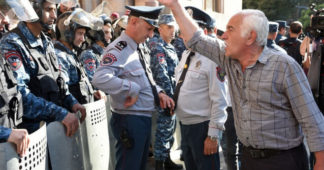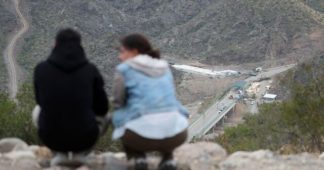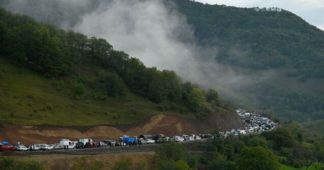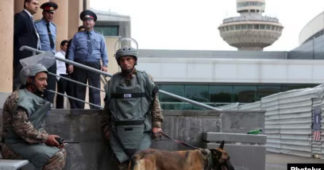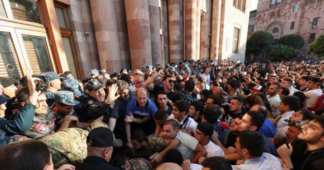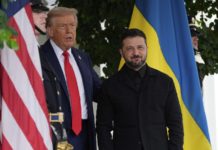By Dionysios Skleris
Jul 5, 2025
A Turkey-Azerbaijan-Armenia axis, in cooperation with Israel, could overturn the dynamics south of the Caucasus, with unpredictable consequences for the processes underway in Western Asia.
The crisis in Armenia continues, sparked by the arrest of Archbishop Bagrat Galstanyan, who is linked to the opposition movement “Holy Struggle.” Through a series of preemptive measures, Armenian Prime Minister Nikol Pashinyan has escalated his confrontation with the Armenian Apostolic Church. At the root of this conflict is criticism Pashinyan has faced from the “Catholicos,” the head of the Armenian Church, Garegin II, regarding Armenia’s defeat in the war with Azerbaijan and the evacuation of Armenians from Nagorno-Karabakh.
The arrested Bagrat Galstanyan is a key figure in this criticism, having led protests in 2024 and voiced popular anger over the loss of the region (2023), which is considered the national cradle of Armenians. Pashinyan, who with Trump-like bravado often resorts to social media diplomacy, labeled Armenia’s clergy as “criminal-oligarchic” and claimed there is a destabilization plot against him. At least 14 individuals have been arrested by Armenian authorities in an unprecedented crisis. In June, Nikol Pashinyan attempted to remove Garegin II from the leadership of the Armenian Apostolic Church, among other things, calling on the faithful to “liberate” the Church.
Among those arrested is billionaire Samvel Karapetyan, owner of the major Tashir Group. Born in 1965, Karapetyan studied engineering in Yerevan and worked for a company collaborating with Russia’s Gazprom before expanding into real estate.
Since 1999, the Tashir Group has been involved in construction, tourism, hospitality, industry, energy, and more, employing at least 30,000 people. In Armenia, Samvel Karapetyan’s group owns a major electricity company. Beyond his significant philanthropy—for which he has been honored by the Church—Karapetyan had invested in and supported the “Republic of Artsakh,” including funding a hospital in Stepanakert, which was later bombed by Azerbaijanis. Karapetyan had announced a $600 million investment to modernize Armenia’s energy sector and had backed the Armenian Apostolic Church in its criticism of the Armenian government. His arrest raises questions about the fate of companies linked to Armenia’s energy sector. Notably, Jerusalem Patriarch Theophilos III voiced support for Samvel Karapetyan following his recent arrest.
The geopolitical significance of the conflict in Armenia is further highlighted by French President Emmanuel Macron’s vocal intervention, expressing France’s solidarity against destabilization efforts in Armenia and emphasizing the importance of peace with Azerbaijan and normalized relations between Armenia and Turkey. In doing so, France endorses Nikol Pashinyan’s “Real Armenia” plan, which calls on Armenians to consider their future and accept long-term peace—or even friendship—with Azerbaijan. However, polls from the past month show two-thirds of Armenians remain skeptical of Pashinyan’s plan. It appears that an axis of Armenia’s friendship with Azerbaijan and Turkey—the two countries that expelled Armenians from their historic homelands—is undesirable for most Armenians and would require heavy state repression to enforce.
Many fear the worst, such as opposition lawyer Ruben Melikyan, who posted that Armenians must protect their sacred relics, Armenian identity, and “God-given right to breathe and exist.” These fears stem from Pashinyan’s aggressive push to replace the popular Armenian Catholicos Garegin II with a more compliant leader, disregarding constitutional provisions on the separation of Church and state. Garegin, however, enjoys significant public support, as seen in the enthusiastic welcome he received at Yerevan’s airport on June 11 after a trip abroad—an event that troubled the Armenian government.
The Crisis in Azerbaijan
A related crisis is unfolding in the broader Caucasus region, equally concerning. Azerbaijan’s government is systematically turning against Russia, banning artistic events linked to Russian entities and arresting Russian journalists in the country. Among other actions, raids were conducted on Sputnik Azerbaijan, part of Russia’s Rossiya Segodnya media agency. A visit by a Russian deputy prime minister to Azerbaijan was also canceled.
Russia’s Foreign Ministry strongly protested to Azerbaijan’s ambassador in Moscow over Baku’s hostile actions, accusing it of deliberately destroying previously strong bilateral relations. Azerbaijan, in turn, labeled Russia’s stance toward its Azeri minority as “systematic violence,” citing a Russian operation in Yekaterinburg where two people of Azeri origin (with Russian passports) were killed, and six were arrested.
Moscow, however, claims it was a criminal group involved in murder contracts and could not be tolerated. Additionally, Russian investigative authorities stated that at least one death resulted from heart failure. This marks the collapse of years of post-Soviet diplomatic relations between Russia and Azerbaijan, which had previously facilitated discussions on Nagorno-Karabakh’s future.
The crisis Azerbaijan has provoked in its relations with Russia ties into the broader context of Western Asia, as Azerbaijan is a key Israeli ally against Iran. The Azeri minority in Iran makes up about 20% of its population—larger than Azerbaijan’s own citizenry. Historically, Azerbaijan was conquered by both Persians and Russians, with the modern independent state being a former Russian province, while much of it was under Iranian control.
Azerbaijan hosts drones that could be used in a future escalation between Israel and Iran. Additionally, Azerbaijan may take a more active role in the Ukraine war theater. Azerbaijan is also a crucial ally of Turkey, which integrates it into its pan-Turkic ideology regarding relations with kindred peoples in Western and Central Asia.
Overall, a Turkey-Azerbaijan-Armenia axis, possibly in cooperation with Israel (despite or alongside current Israeli-Turkish disputes in Syria), could overturn the dynamics south of the Caucasus, with unpredictable consequences for Western Asia.
Dionysios Skleris has studied Litterature, Philosophy, Theology, and History at the Universities of Athens, London, and Paris. He has worked on the problem of evil, Maximus the Confessor, literature, and trap music.
The article was published in Kosmodromio.gr. Translated by Christian Haccuria.
